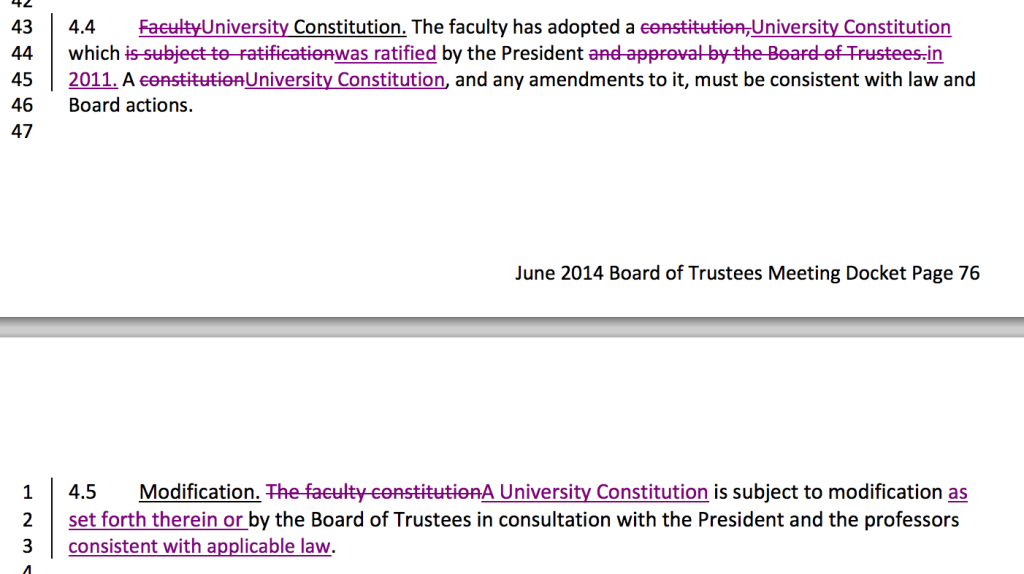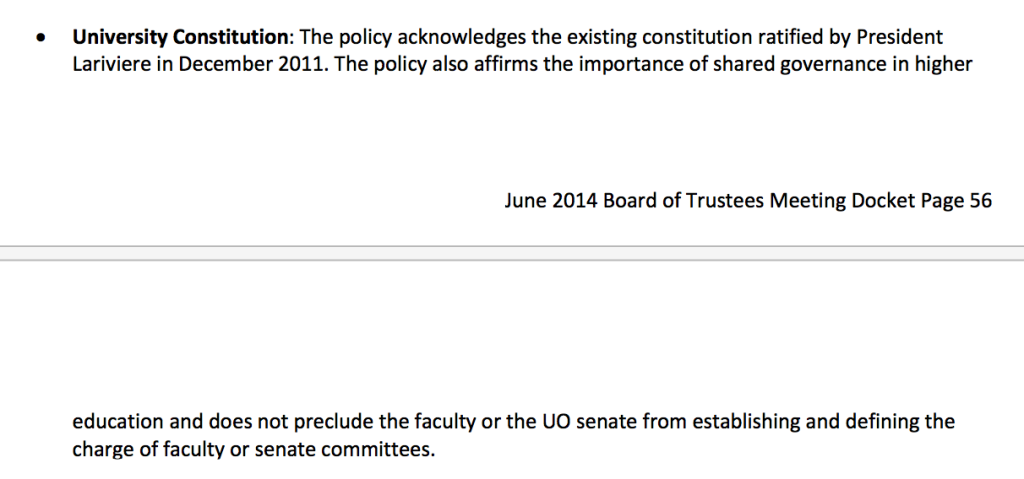UO General Counsel Randy Geller has also been acting as the Interim Board Secretary and General Counsel for the Trustees. It’s a situation ripe for potential conflicts of interest. On the one hand Geller works as President Gottfredson’s attorney, who can fire him (or encourage him to resign, and write him a nice letter of recommendation for a new job, or not.) On the other hand he works for the Board of Trustees, who can fire Gottfredson.
The most contentious issue to come up in the Trustee’s meetings so far has been the Delegation of Authority policy, which lays out the powers of the Board, the President, and the Faculty and UO Senate. This policy will be crucial to how shared governance will work at UO under the new Board.
President Gottfredson and Randy Geller originally brought this before the Board in March, without any notice to the faculty or the Senate. I found out about it a few days before the meeting, as explained here. John Bonine (Law) went before the board and explained the many problems with the administration’s proposal. The Trustees then agreed to defer consideration until June, while the Senate reviewed the proposal.
The Senate formed an ad hoc committee, which proposed many revisions to ensure that the policy was consistent with state law and with the best practices for shared governance at other universities. That committee’s website is here: http://senate.uoregon.edu/content/ad-hoc-committee-delegation-authority-policy.
The administration accepted some, rejected most, and sent the new draft back to the board. That new policy starts at page 60 of the June meeting docket, here: http://trustees.uoregon.edu/sites/trustees1.wc-sites.uoregon.edu/files/field/image/June%202014%20BoT%20Agenda%20%26%20Docket%20053014_0.pdf.
A redlined version showing the changes from the administrations original starts at page 69. The Senate’s proposed changes, with explanatory notes, is here: http://senate.uoregon.edu/sites/senate.uoregon.edu/files/Policy%20on%20Delegation%20of%20Authority%20Edits%20and%20Comments.pdf.
Not many changes were accepted by the administration. For example, the administration wanted to give the President the power to define the charges of all committees (redlines are from the original March proposal), and the new policy kept that:
Another change, recommended by the Senate’s ad hoc committee, was to ask that the administration at least get the facts about the UO Constitution right.
My read of 4.5 is that this Delegation of Authority policy trumps the UO Constitution (as it must by law) and therefore section 3.4 of the Delegation of Authority policy now gives the President the power to determine the charges of Senate committees, without even getting board approval. This is totally unprecedented, a serious challenge to faculty authority, at odds with AAUP recommendations, inconsistent with what UO has told its academic accreditors in the past, and will have to be revisited soon.
But that’s not the way the Administration tried to sell the policy to the board or the university community. The docket given to the Trustees for the June 12-13th meeting and posted online says:
This statement is, of course, not binding. The policy is. (And the fact that the administration can’t even bring themselves to capitalize Senate is not a good sign.)
At the June meeting Senate President Rob Kyr spoke to the Trustees about the continuing problems with the policy as revised by the administration, and the vital role of the Senate and faculty in shared governance. The Trustees debated the new policy at length, but in the end adopted it, with the caveat that they would be willing to revisit if, if necessary.
My guess is that President Gottfredson will never exercise his new power to change the charges of Senate committees, even if it lasts. He’ll adopt a more passive-aggressive approach. The real threat to the faculty’s role in shared governance will come from Gottfredson setting up a parallel system of “administrative advisory groups”, stacked with his few remaining faculty supporters, or those hoping to get high paying administrative jobs or sinecures. This has been, for example, his tack with the “Budget Advisory Group”, and his attempted end run around the Senate Intercollegiate Athletic Committee, as explained in the post here.



I believe our admin is sloppy, dumb, and incompetent. You believe they are pure evil. Honestly neither is acceptable and we deserve better.
And the UO is a mediocre establishment at best. Enough with the self congratulating!
Watch it – my colleagues are excellent! You may be right about JH though. Or maybe they’re just rational and self-interested. Very, very self-interested.
Good catch, UOM. Totally agree about the likelihood of a parallel system of advisory groups.
A troublesome situation: some Trustees willingness, after Kyr addressed them Thursday, to say there had been “enough input” and so they should vote as though the expenditure of volume and time, rather than the importance and significance of issues brought by the Senate, were the important criteria. A bit dismissive? Add to that Gottfredson chiming in with “it can be changed later” which, to me, always signals self-interest, lazy thinking and a tendency towards irresponsibility.
I’m not that surprised, they’ve got a full plate of other issues besides governance to take care of. Soon they will start dealing with more and more of the substantive issues that the administration has screwed-up on because of lack of consultation with the faculty, and the JH excuses will start to wear thin. Seems to me there was more than a little of that apparent already in the Paulson reports.